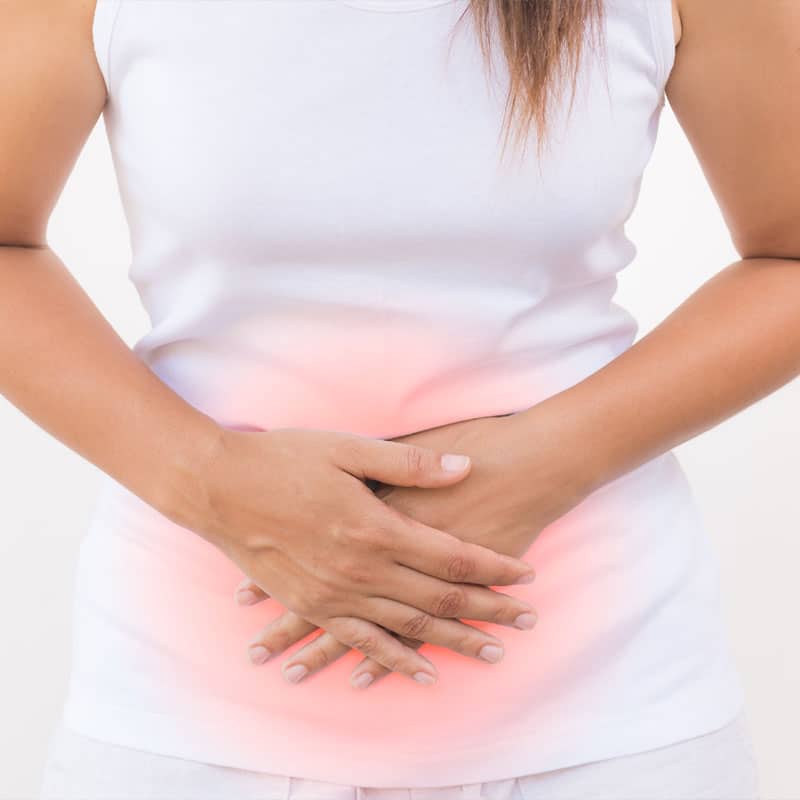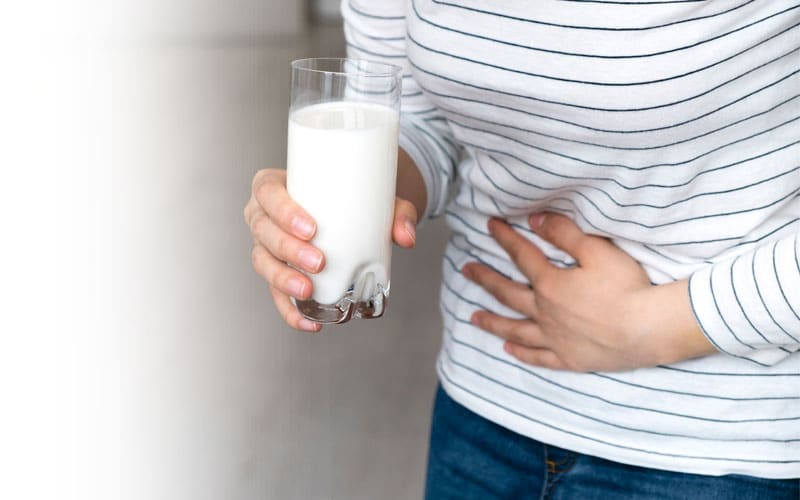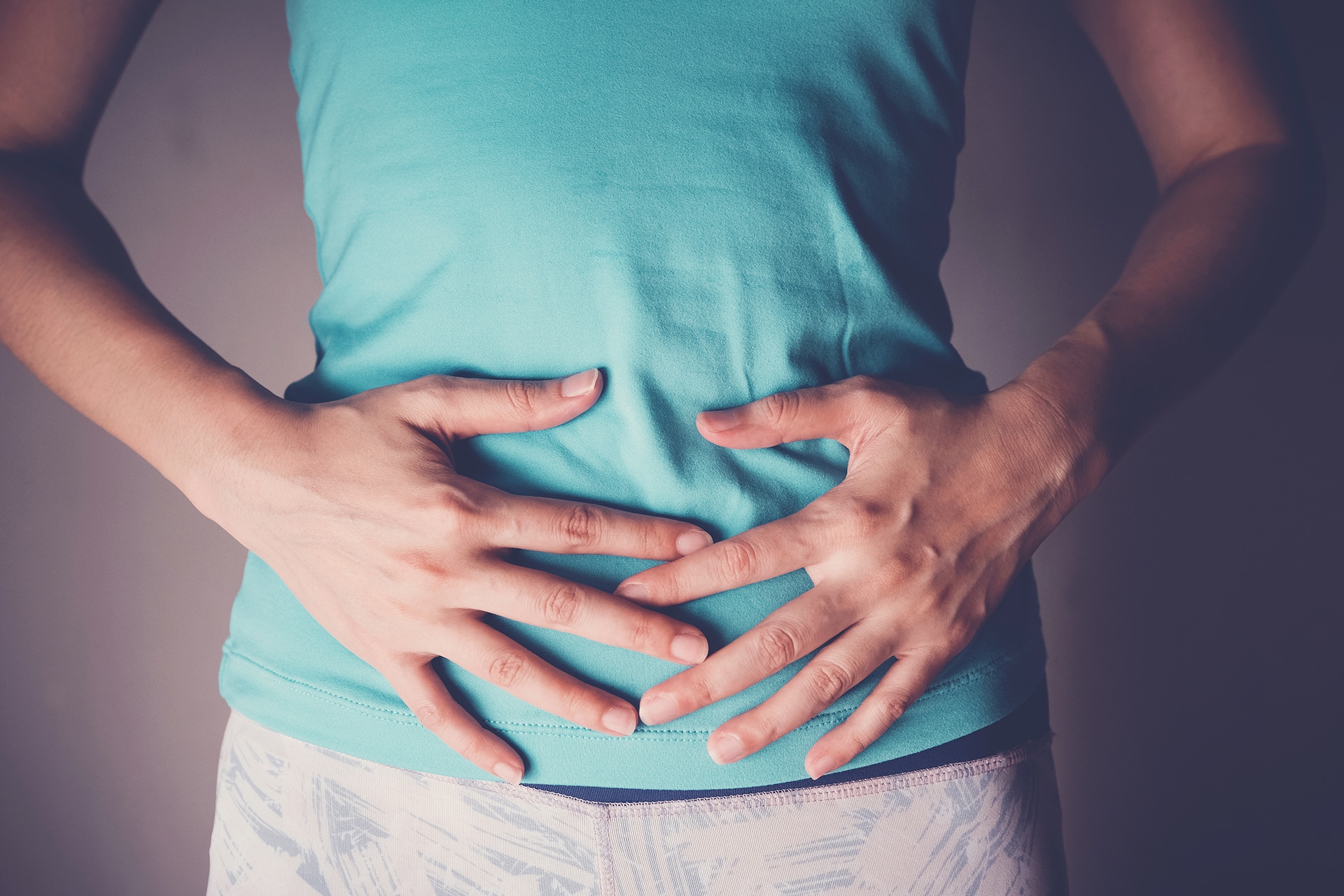Index
Food is supposed to be enjoyable; however, mealtime can be challenging when you feel bad after every meal. You may wonder, “Why do I feel bad after I eat?” Determining the root cause can be challenging for several reasons. Let’s examine how your digestive system works, the common causes of digestive problems, and the top natural remedies for relieving digestive issues.

How Does Your Digestive System Work?
Your digestive system is an intricate system that breaks down food, turns it into nutrients, and prevents dangerous microbes, toxins, and chemicals from entering your bloodstream. When you chew and swallow your food, it travels down the esophagus until it reaches your stomach. There, it mixes with stomach acid and then travels through the intestinal tract, where digestion occurs.
Your digestive tract runs from your mouth to your Colon and includes a variety of organs, nerves, hormones, and bacteria. Because of the complexity of your digestive system, many things can go wrong. Let’s take a look at the common symptoms you may experience after eating and the causes of these symptoms.

Symptoms of Digestive Problems
When your digestive system is not functioning correctly, you can experience a variety of uncomfortable symptoms, such as
- Abdominal Pain
- Bloating
- Cold Sweat
- Constipation
- Cramping
- Diarrhea
- Dizziness
- Gas
- Hives
- Itching
- Low Grade Fever
- Stomach Gurgling
- Stomach Pain
- Vomiting
- Right Upper Quadrant Pain

Causes of Digestive Disorders
Several causes can make you feel sick after a meal, including food poisoning and pregnancy. Here are the top ten reasons you experience sickness, abdominal pain, and more after eating.
- Acid Reflux—Acid reflux occurs when the valve between your stomach and esophagus does not close properly, allowing stomach acids to rise into your esophagus. When this happens, you can experience pain and burning behind your breastbone, as well as nausea.
- Carbonated Beverages—Drinking more than one carbonated beverage can stress your digestive system and result in bloating, abdominal pain, and gas. When you drink carbonated beverages, you swallow pockets of air, which can become trapped in your stomach and cause pain.
- Food Intolerance—A food intolerance occurs when the body has difficulty digesting a specific type of food or a component found in food. For example, if you are lactose intolerant, your body cannot digest the lactose (a sugar) in dairy products. You can experience food intolerances for years without even knowing it. Food intolerances cause numerous subtle symptoms, including nausea, fatigue, weight gain, migraines, brain fog, and low-level inflammation.
- Food Poisoning—Mishandling food, inadequate refrigeration, unsafe storage, and consuming raw or undercooked meat and eggs can cause food poisoning. Contaminants, including bacteria and viruses, can cause food poisoning. The symptoms of food poisoning include nausea, vomiting, and diarrhea. Typically, these symptoms start within a few hours of consuming contaminated food.
- Gallbladder Problems—When your gallbladder is not functioning correctly, it will not produce the bile needed to digest your food properly. Bile contains an acid that is necessary for breaking down fats. The most common symptoms of a gallbladder problem include right upper quadrant pain that can extend into the back near the shoulder blades. You may also experience nausea, vomiting, and diarrhea.
- Improper Chewing—Digestion begins in the mouth. As you chew, your salivary glands secrete enzymes that help break down food. If you do not adequately chew your food, your digestive system must work harder, which can cause several digestive woes. You should chew your food until it is almost liquified; otherwise, you can experience abdominal pain, bloating, and gas.
- Low Fiber—Fiber is vital to proper digestion. Unfortunately, most people are not eating enough fiber. Fiber helps clean the digestive tract, remove toxins, and feed the beneficial bacteria in the digestive tract. In addition, fiber helps regulate hormone levels, balance glucose levels, and keep you feeling fuller for extended periods. Fiber can also help with weight loss. The most common symptoms of low fiber include constipation, diarrhea, bloating, flatulence, and abdominal pain.
- Remain Upright—It may be tempting to lie down after a delicious meal, but this can slow digestion and increase the risk of heartburn and indigestion. For best results, eat at least two to three hours before bedtime. For best results, take a walk after you eat. Research has shown that walking after a meal speeds up digestion, decreasing the risk of digestive issues following a meal.
- Unbalanced Gut Bacteria—Your digestive tract contains trillions of beneficial and detrimental bacteria, fungi, and yeasts. The beneficial microbes are essential to your digestive health. They help break down your foods and enhance your immunity and overall health. When our gut bacteria become imbalanced, it can cause many digestive problems, including constipation, diarrhea, bloating, inflammation, and abdominal pain.
Steps To Improve Your Gut Health
Digestive health issues are often complex and require the assistance of medical professionals. Our team of digestive health specialists uses proven protocols to help correct issues that are causing your digestive problems. Treatment plans may include:
- Food Diaries—A food diary will help identify any food-causing issues.
- Well-Balanced Diet—Eating a well-balanced diet ensures that your body has the necessary nutrients to keep your digestive system functioning correctly.
- Herbs for Bacterial or Viral Infections—Several herbs, including olive leaf extract, oregano, garlic, and berberine, help destroy harmful bacteria and viruses and repair damage to the digestive tract.
- Soothe the Digestive System—Lemon balm and marshmallow root help soothe the nerves in the digestive tract and reduce inflammation in the gastrointestinal tract.
- Vitamin and Mineral Supplementation—When you have a digestive issue, you can experience several nutritional deficiencies. Supplements can help your body repair itself, including the intestinal tract.
- Avoid Fatty and Spicy Foods – Fatty and spicy foods can irritate the digestive tract. It can also increase the risk of gallstones. Limiting fatty foods and spicy foods gives your body time to regenerate.
- Exercise—Exercise is essential to optimal digestion. It helps to improve gut motility, decrease inflammation, and reduce stress.
- Stress Relief Techniques—Stress relief techniques help decrease anxiety and stress. Some of the best methods for digestive health include meditation, deep breathing exercises, and yoga.
If you experience regular abdominal pain, gas, bloating, diarrhea, nausea, vomiting, and constipation, eating can be a chore. Many causes of these symptoms include food intolerances, stress, improper chewing, and more. Working with a gut specialist can help improve your digestion and overall health and well-being. Our functional medicine clinicians help determine the root cause of your digestive woes and use holistic treatment approaches to improve your gut health.























